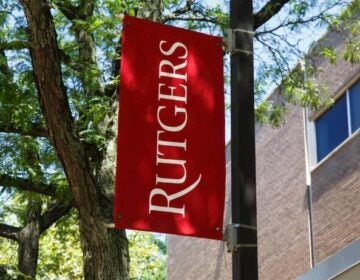New Jersey lawmakers try to stall state plan to privatize lottery
Two bills prompted by the state’s effort to partially privatize the New Jersey Lottery – which has been met with a groundswell of complaints from small retail operators who fear they will ultimately lose money – were approved Monday by an Assembly committee.
Legislators had hoped to hear about the plan to outsource the sales and marketing of the $2.8 billion lottery from the state treasurer and the head of the lottery, but both officials declined for the second time to even testify, prompting threats of subpoenas.
“We advised the committee we believe it would be inappropriate to testify about this matter while it is still in the procurement process,” said William Quinn, a spokesman for state Treasurer Andrew P. Sidamon-Eristoff.
The Assembly Budget Committee passed 8-4, along party lines, one measure that would require the administration to get legislative approval before entering into a private contract to operate the lottery and another urging Gov. Chris Christie to seek a legal opinion from the U.S. Department of Justice before signing a contract to make sure that the change would not violate federal law.
But the two bills lack teeth, since the Legislature has no real authority over the state lottery and the bills would need the signature of Gov. Chris Christie, whose administration proposed the change.
Committee Chairman Vincent Prieto (D-Hudson) said the administration’s continual refusal to discuss the matter is “getting a little frustrating.”
Assemblyman John Burzichelli (D-Gloucester) said their refusal to testify has prevented committee members from being able to determine whether the privatization would be in the best interests of the state and the public.
Calling for issuance of subpoenas, Burzichelli added, “This is the second time our invitation has been declined. I don’t know what we have to do to be taken seriously.”
This was the second hearing the Assembly Budget Committee has held on the question of lottery privatization. The first, held Dec. 5, took place before the state received a bid, and only one, in response to its request.
The details of that proposal, submitted Dec. 27 jointly by GTECH and Scientific Games with backing from a subsidiary of the Ontario Municipal Employees Retirement System (OMERS), remain confidential while state procurement officials evaluate the package, Quinn said. He said if officials determine the firms have met all the requirements of the state’s proposal they will decide whether the deal makes sense and, if so, begin negotiations. If a contract is awarded, its terms will become public.
State worker unions and small business owners have been fighting the plan. The business owners warn they could lose revenues, forcing layoffs or store closures, if the contractor moves to sell tickets online. The unions fear about 60 state lottery workers could lose their jobs if the private consortium takes over sales and marketing functions.
Seth Hahn, New Jersey legislative and political coordinator for the Communications Workers of America local that represents the workers, was highly critical of the proposal, and of GTECH in particular.
“Unfortunately GTECH is a company that should not be considered for such a substantial account and it has a history of fraud, abuse and business practices ranging from questionable to illegal,” said Hahn, noting that in the 1990s a GTECH executive was prosecuted for money laundering and political kickbacks in New Jersey by then-Assistant U.S. Attorney Kim Guadagno, the current lieutenant governor.
He added that, six years ago, Scientific Games protested after submitting a lower bid for scratch tickets in the state but lost out to GTECH, prompting the state treasurer to rebid the contract.
“Literally six years ago, Scientific Games was saying that GTECH was so corrupt that they should not have access to contracts in New Jersey and now they are entering into a contract with the same company, which raises very important questions about whether there was actually competition here or whether this is collusion,” Hahn said.
He further cited complaints or investigations involving GTECH in Texas and Washington, D.C. and controversy over the contract GTECH and Scientific Games have to run the Illinois lottery, the first in the nation to be privatized. There, the companies did not meet expectations in the first year and won a fight to reduce the amount of the penalty that had to be paid as a result.
Representatives of both GTECH and Scientific Games did not return calls for comment.
In addition to Illinois, Indiana and Pennsylvania have also privatized lottery operations.
Under the state’s bid request, unveiled without fanfare last August, the winning contractor is to pay the state $120 million upfront and would have to meet certain growth targets over the 15 years it would be in force or pay penalties.
Administration officials have estimated the firm could make $1 billion over the life of the contract. New Jersey would have to get at least 30 percent of the total revenues from ticket sales as required by law. Last year, close to $1 billion in lottery proceeds funded state institutions and education.
Hahn argued there is no reason to privatize sales and marketing because the state lottery has been growing, performs better than the national average and is “the most efficient lottery in the country.”
“The proposal to privatize without public explanation one of our most profitable and well-run assets is troubling,” Prieto said. “The Christie administration appears ready to forfeit substantial long-term revenue for a one-shot payment that will also hurt small business owners and risk vital programs for our students, veterans and the disabled.”
But Assemblyman Declan O’Scanlon (R-Monmouth) said the state’s goal is to increase lottery revenues. He said the process has been public and that administration officials will provide further details at the appropriate time but not while they are still evaluating the bid that came in.
“This is all politics, quite frankly,” he said as he voted against both bills.
Assemblyman Patrick J. Diegnan Jr. (D-Middlesex) disagreed.
“It’s difficult to rationalize privatization under any circumstances,” said Diegnan, one of the sponsors of the bills approved on Monday, “but it would be irresponsible to go forward with an award when only was bid was submitted.
“I, too, am afraid of bad change,” said Assemblyman Gary Schaer (D-Passaic), who voted for the bills. “The demand for additional transparency makes a lot of sense.”
If passed by both houses and signed into law, A-3614 would prohibit the state from privately contracting lottery operations.
But given that the Christie administration launched the privatization effort, it is unlikely the governor would sign a bill preventing him from going forward. The Democrats do not have enough votes to override a gubernatorial veto.
The other measure, ACR130, does not need Christie’s approval, but would urge him to ask federal justice officials if the privatization contract is legal prior to signing it. Democrats said a 2008 memorandum from the Department of Justice outlined the circumstances under which lottery operations could be operated privately.
“Because of the importance of the state Lottery to the continued well-being of the citizens of this state and the magnitude of the potential consequences of a failure to continue to meet all federal requirements, it would be imprudent to proceed … without first obtaining legal advice from the United States Department of Justice,” said Assemblyman Sean Connors (D-Hudson), who sponsored that measure.
NJ Spotlight, an independent online news service on issues critical to New Jersey, makes its in-depth reporting available to NewsWorks.
WHYY is your source for fact-based, in-depth journalism and information. As a nonprofit organization, we rely on financial support from readers like you. Please give today.




